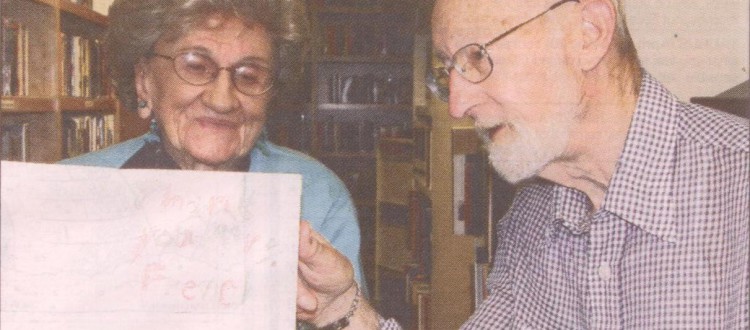Anyone got a dikshunary?
Arline French has one, and she knows how to spell it. The 82-year-old resident of Concord’s Havenwood-Heritage Heights Retirement Community recently spent some time drumming up financial support for a project to give dictionaries away. But I’m getting ahead of myself. Let’s switch to Arline’s daughter-in-law, Mary French who, in 1995, was living in Charleston S.C. when two thoughts led her in the same direction: She read a letter to the editor of a local newspaper by someone who felt that dictionaries in schools would be a good teaching aid and had accordingly embarked on a project to provide dictionaries to pupils in the Charleston school district. It reminded Mary of her own school days, when she had been a notoriously poor speller, and she resolved to do something about it. It wasn’t long before she began soliciting donations that enabled her to start providing dictionaries to third graders in the Charleston schools. Why third grade? Because that is the grade wherein children begin to work independently; whereas in earlier grades children have to learn to read, in the third grade they begin reading to learn.
Mary’s initial goal was fairly modest: to provide a dictionary for every third grader in the district. But it soon began to expand, thanks to articles in The Wall Street Journal and other publications. Her project has now reached every state of the Union, some of the islands, and several countries including Iraq, Pakistan and Afghanistan, and the goal has expanded to cover every third grader in the USA. Some 2 1/2 million dictionaries were distributed in 2009, and the total for the project now exceeds fourteen million. The recipients, in all fifty states, can choose between several types of dictionary, including English-Spanish and others. And the books are not simply lists of words: they include the presidents of the United States, the Constitution, tables of weights and measures, and information about the States.
Obviously all this involves a considerable amount of effort, not simply with book handling. Each book has to be provided with a name plate, which the pupils are encouraged to fill in as soon as they receive their books, and a book mark, which draws attention to the project. In addition a large amount of work is involved in attracting contributors. The individual books are not expensive–of the order of one dollar by special arrangement with the publisher–but when that is multiplied by millions, the effort, by many people, is very time-consuming. One of their functions is to encourage the children to write letters to the Project, some of which illustrate the value of the dictionary, and some the need for it. "I am expanding my vocabulary," for instance, and "I teach my mom and dad to speak better English." The children in some schools have been so enthusiastic as to raise further funding to provide books for other schools.
Consider, for instance, David Boynton, of the Pemigewasset Valley Pomona Grange in Plymouth, NH. He took charge of the entire project in the State of New Hampshire, running a staff of many volunteers for seven years until illness forced him to hand over the reins. Not the least aspect of his work was the keeping of very detailed records, to simplify the job for his successor.
Now let’s get back to Arline French. Funding comes from a variety of sources, in amounts as small as five dollars, but obviously larger sponsors than that are needed. Arline put in two years working for the project, and stopped only when she moved to Hawaii for the winter to stay with her daughter. She began her work with sixteen schools in the Kearsage area. Having successfully brought the schools on board she began a search for sponsors. These include private individuals, but the bulk of the funding comes from a variety of organisations; for instance more than sixty Rotary Clubs are involved throughout the nation. Arline limits her contributions these days to talking about the project, which she does at the drop of, er, a dictionary.
Further support comes from articles in the press, such as this one, and other publications such as "Simple Acts of Faith," a book with illustrations by Norman Rockwell.
You can read much more about the project at www.dictionaryproject.com.
by: Rufford Harrison, contributing writer, The Weirs Times, February 24, 2011






